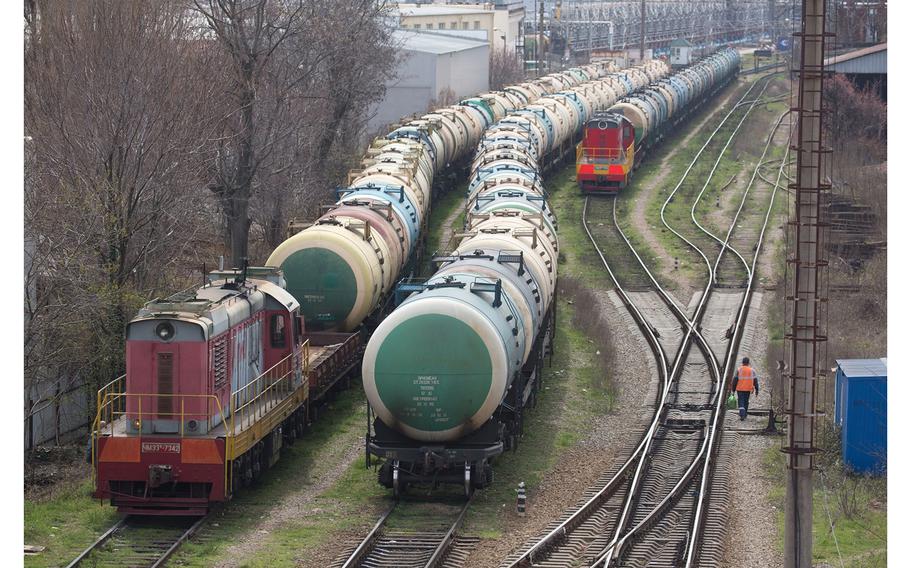Europe
Ukraine launches new wave of strikes against Russia’s oil facilities
The Washington Post March 13, 2024

Rail cars sit on the tracks at a refinery in Tuapse, Russia, on March 23, 2020. Ukraine and Russia traded attacks on each other’s territory Wednesday, March 13, 2024, including a second day of drone attacks against Russian oil facilities, which President Vladimir Putin called an attempt to disrupt presidential elections set for this weekend. (Andrey Rudakov/Bloomberg)
KYIV — Ukraine and Russia traded attacks on each other’s territory Wednesday, including a second day of drone attacks against Russian oil facilities, which President Vladimir Putin called an attempt to disrupt presidential elections set for this weekend.
One of the Ukrainian drones struck an oil refinery in the Ryazan region, about 100 miles southeast of Moscow, causing a fire that was extinguished after a few hours, local governor Pavel Malkov said. A Ukrainian official with knowledge of intelligence operations, speaking on the condition of anonymity because of the sensitivity of the issue, confirmed that the refinery was the target.
“We are systematically implementing a meticulously calculated strategy to reduce the economic potential of the Russian Federation,” the official said. “Our task is to deprive the enemy of resources and diminish the flow of oil money and fuel that Russia directly channels into war and the killing of our citizens.”
Russia’s Defense Ministry, however, maintained that it had shot down all 65 of the drones launched at six Russian regions overnight.
It was the second attack on Russian territory in two days, after Ukrainian forces launched drones Tuesday against nine Russian cities and towns — some far inside the country — including the oil facilities at Nizhny Novgorod, which caught fire.
The two days of attacks represent Kyiv’s most wide-ranging assault on Russian infrastructure since the war started, sending a message of Ukrainian resilience ahead of Russia’s elections, which are taking place over three days, from Friday to Sunday.
They also indicate Kyiv’s increased emphasis on striking deep into Russia proper, as Ukrainian forces struggle with shortages of shells and soldiers on the front line and Russian forces are escalating their offensive.
Last week, a Ukrainian drone hit an oil depot in the Belgorod region, and since the beginning of the year, Ukraine has attacked more than a dozen oil and gas facilities — including refineries, oil depots and gas terminals — in seven regions.
On Wednesday, Ukraine’s biggest attack was on the Voronezh region in southwest Russia, where 35 drones were intercepted, the Russian Defense Ministry said.
The Ukrainian official said that drones also targeted “a Russian Aerospace Forces base in Buturlinovka and a military airfield in Voronezh.” This information could not be independently verified.
Drones also attacked the Novoshakhtinsk oil refinery in the Rostov region of southwestern Russia, Rostov governor Vasily Golubev said on Telegram, also temporarily putting it out of commission.
Electronic jamming equipment forced the drones to land on the territory of the refinery without any injuries, but “technological facilities of the enterprise have been stopped,” Golubev said, about which “the consequences are being clarified.”
Ukraine’s military intelligence service “could not confirm or deny its involvement in the operation,” spokesman Andriy Yusov said, adding that the facility was “used for military purposes.”
Another drone struck the headquarters of the FSB, Russia’s domestic intelligence agency, in Belgorod, near the border with Ukraine, Russian news agency Tass initially reported, but it later removed the report from its website. Unverified photos on social media showed the building with its windows blown out, however.
Ukrainian officials, meanwhile, reported Russian drone and missile attacks in the Sumy and Donetsk regions, some of which hit residential buildings, killing half a dozen people and injuring scores.
Putin gave an interview to Russian media outlets Wednesday in the run-up to the presidential elections, which are widely expected to return him to a fifth term — allowing him to rule until at least 2030.
Putin said he had “no doubt” that the “main goal” of the recent attacks was “if not to disrupt the presidential elections in Russia, then at least to somehow interfere with the normal process of expressing the will of citizens.”
Putin also said that “from a military-technical point of view,” Russia was “of course, ready” for nuclear war. Nevertheless, he didn’t think that the United States was “ready to start this nuclear war tomorrow.”
“They are developing all their components, and so are we,” he said. If the United States wants war, “what to do?” he said. “We are ready.”
Putin said Russia was not considering using nuclear weapons in the fall of 2022, when Russia’s position temporarily worsened, as U.S. officials warned at the time. “Our front was not collapsing” in eastern Ukraine, he said.
Still, “weapons exist in order to be used,” he said, “if it is a question of the existence of the Russian state.”
On Wednesday, Leonid Volkov, the longtime chief of staff of the late Russian opposition leader Alexei Navalny, blamed Putin and his supporters for an unknown assailant’s attack on him with a hammer and tear gas near his home in Lithuania on Tuesday.
“This was a obviously a typical, characteristic bandit ‘hello’ from Putin and from bandit St. Petersburg,” Volkov said in a short video posted on social media after returning from the hospital. Putin was born in St. Petersburg and started his political career there.
Lithuanian police said they were devoting “huge resources” to investigating the attack.
Volkov described the assault as an attempt “to make a meat cutlet out of me a man attacked me with a meat hammer right outside the house.” He added that his arm was broken but “for some reason my leg remained intact,” despite being hit 15 times.
Morgunov reported from Warsaw and Abbakumova from Riga, Latvia.